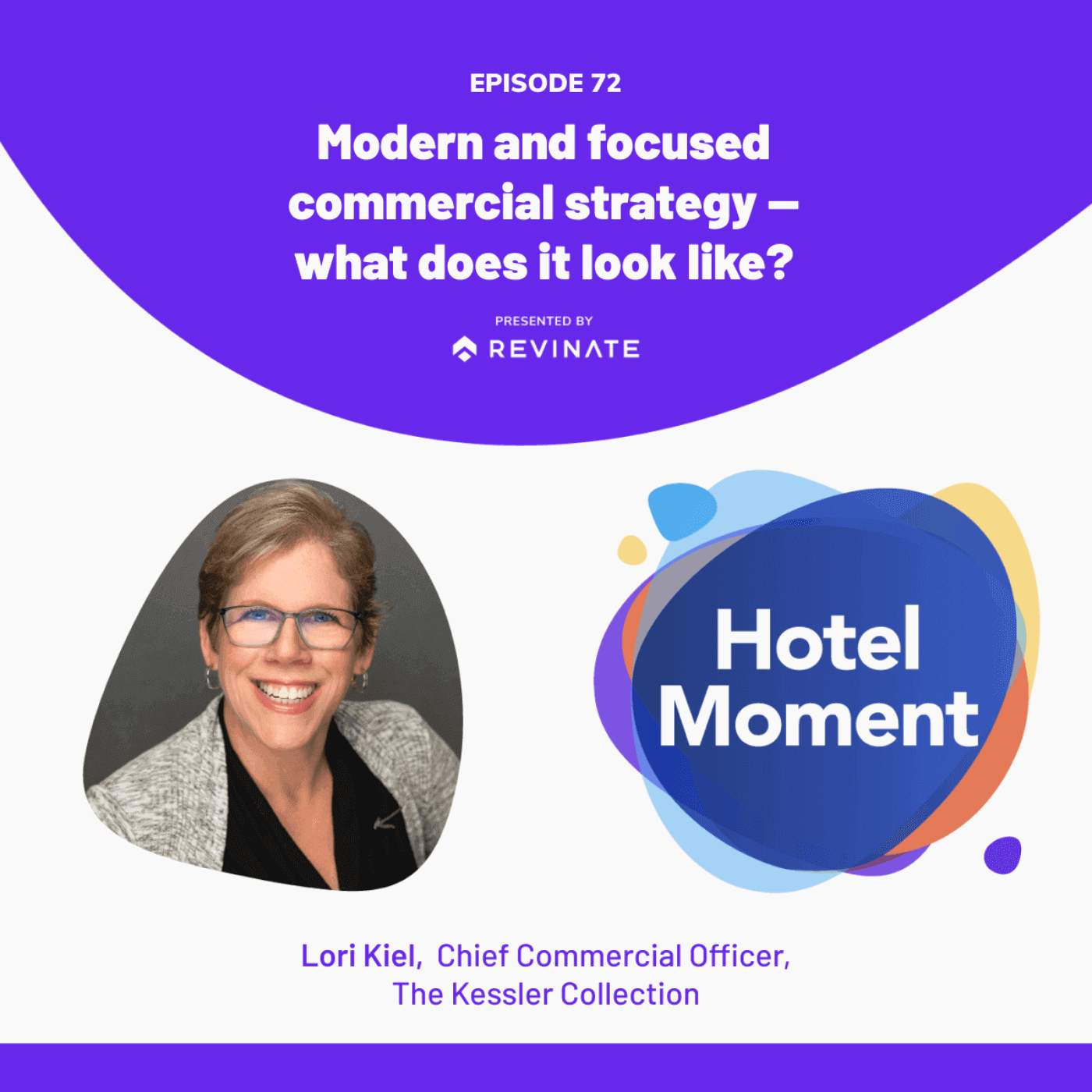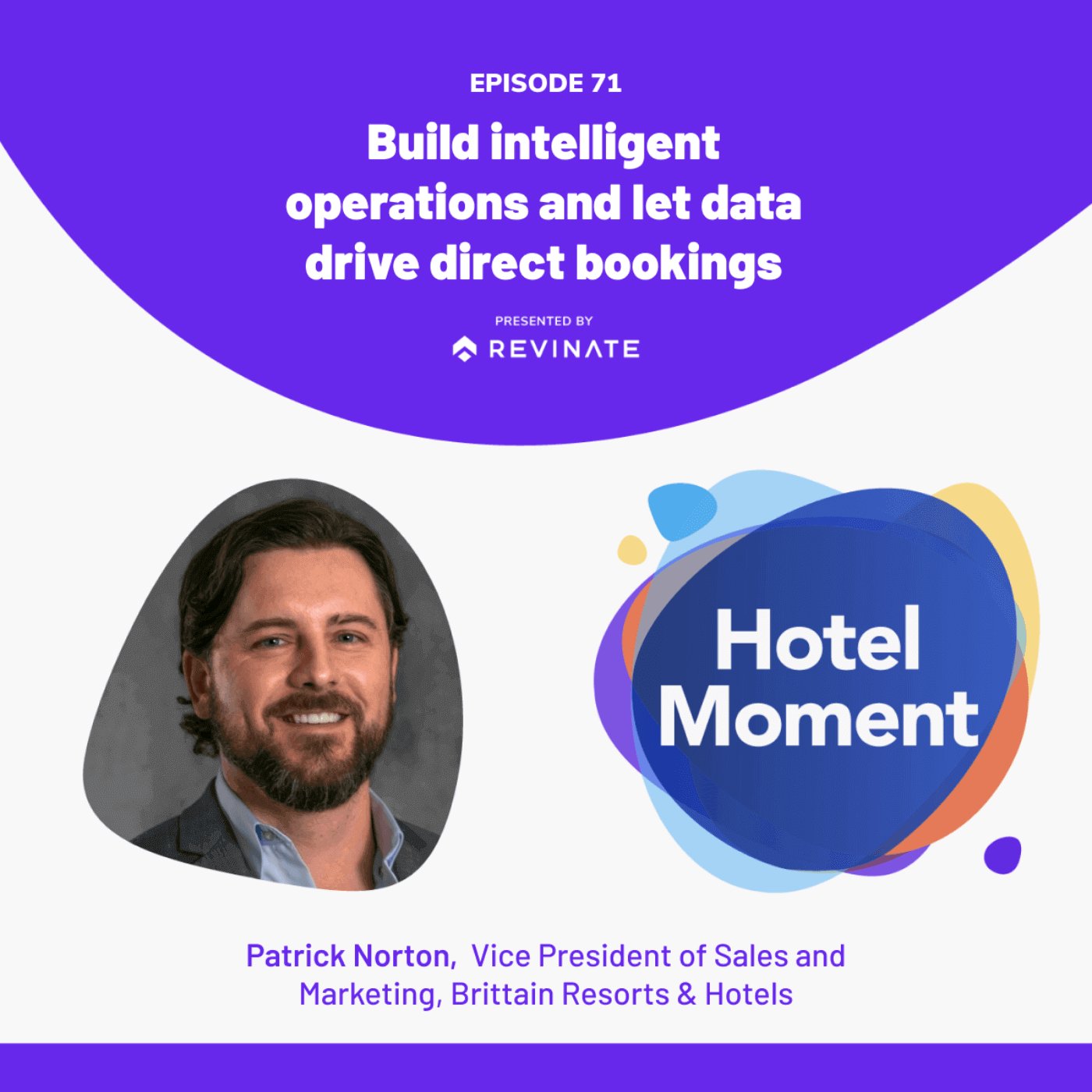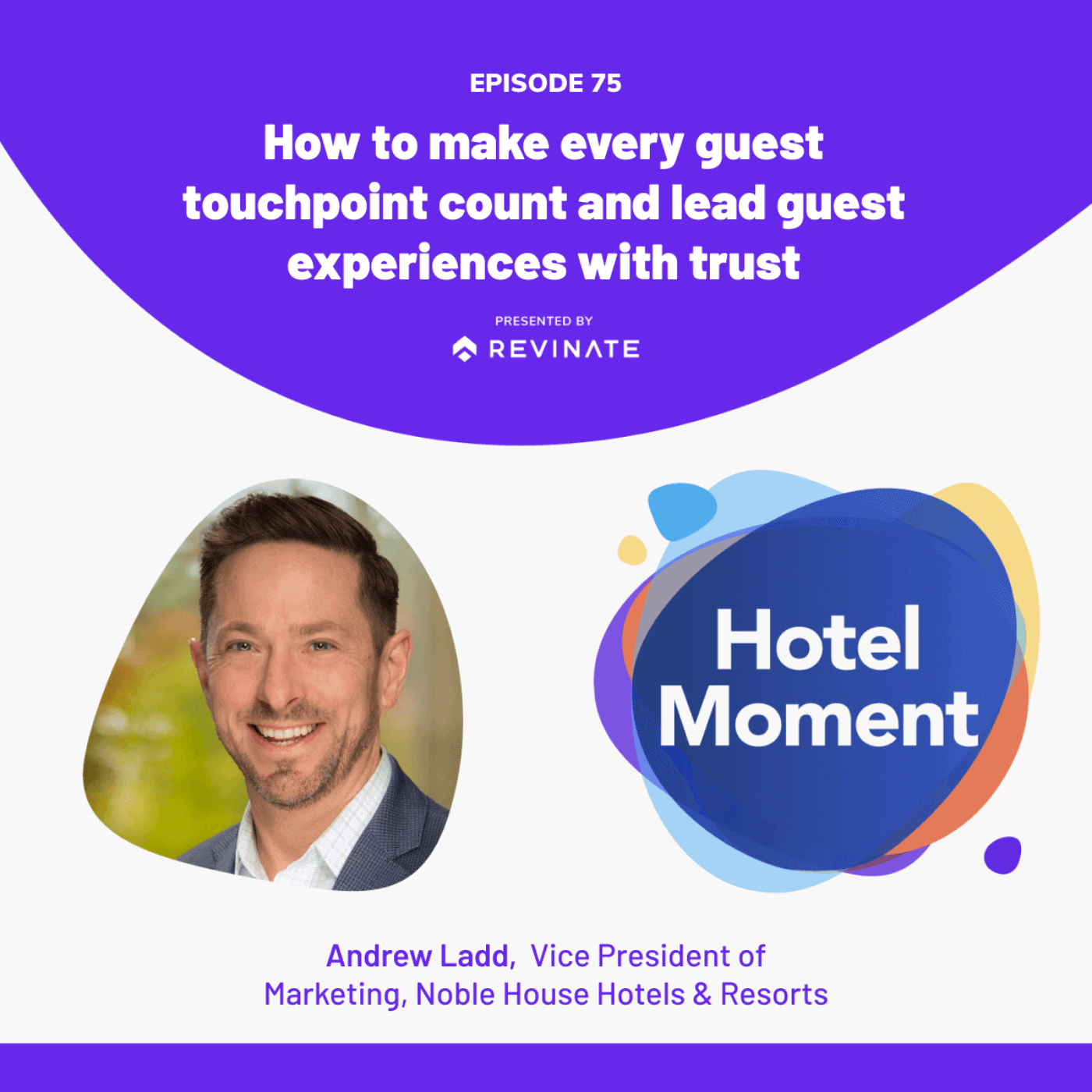

The Hotel Moment podcast — episode 75
How to make every guest touchpoint count and lead guest experiences with trust
In this week’s episode of the Hotel Moment podcast, Karen Stephens, Revinate CRO, and Andrew Ladd, VP of Marketing at Noble Hotels & Resorts, go below the surface to discuss what it means to gain the trust of guests. Hoteliers are at a huge advantage when it comes to leveraging technology to gather data to better understand their guests, but Ladd reminds us that keeping in mind data privacy and security are equally important to that mission.
Tune in for an eye-opening conversation on championing personalization to create experiences that guests will love and appreciate while making trust a priority to remain transparent in your brand’s operations.

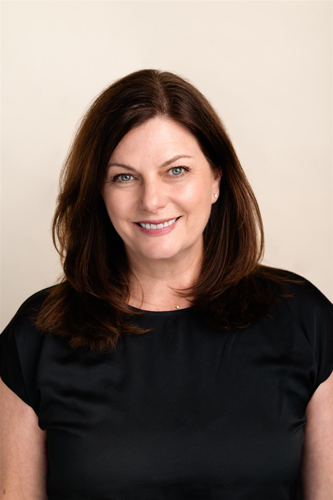
Meet your host
Karen Stephens is Revinate’s Chief Revenue Officer and runs the sales, marketing, and customer success teams. She has more than 20 years of experience in the industry alone.
On the Hotel Moment podcast, Karen speaks with leaders to draw out their experiences and insights. She is also a Francophile and Prof K — a coach, a mentor, a guide to the people who work with her.
Now Playing
Transcript
Intro: 00:00:02: Welcome to the Hotel Moment podcast, presented by Revinate, the podcast where we talk to leaders in the hospitality industry. If you’re looking for trends, perspectives, and stories from leaders in travel and hospitality, you’re in the right place.
Karen – 00:00:21: Hello and welcome everyone to the first Hotel Moment podcast of 2024. I am your host, Karen Stephens, the Chief Revenue Officer of Revinate. And today we are thrilled to have with us Andrew Ladd, someone who knows the hospitality industry from top to bottom. Andrew has experience with boutique and large-scale resorts, and he understands as well as anyone how to put together a cross-functional team that works to craft truly memorable experiences for their guests. Yes, dedicated to exceeding both expectations on the customer and business side, Andrew can do it all. He’s been with Noble House Hotels & Resorts for five years now, and I am pleased to announce he has recently been promoted to Vice President of Marketing. He also completed the Kellogg Executive Certification, Prudential, and Digital Marketing Strategies, and we’ll talk about that as well. So welcome to the show, Andrew.
Andrew – 00:01:09: Hey, thank you, Karen. Appreciate you having me here.
Karen – 00:01:12: Wow, it is a pleasure to have you. I mean, first of all, congratulations on the promotion. That is tremendous. We’ve been working with you for a long time, over five years now, and that is really just wonderful for you. So congrats.
Andrew – 00:01:22: Thank you so much. I really appreciate that. I’m really excited.
Karen – 00:01:26: In the intro there, I talked about the Kellogg Executive Education Credential, and I know it’s important to stay on our toes here in hospitality. And I always admire when one of my colleagues carves out the time to actually do further education. So can you talk a little bit about that certification and your motivation to do that?
Andrew – 00:01:45: I’m a big believer in continuing education for myself and then also anybody that I work with, colleagues. I highly encourage it. The motivation behind it was I’ve taken a few certifications, obviously, with the HSMAI. And then prior to that, a certification with Cornell University for marketing as well. And it’s a really fantastic way to stay on top of the trends and what’s happening and learn from those other experts. And I specifically sought out this certification because it existed outside the hospitality vertical. I wanted to learn more about how other industries and other verticals are approaching marketing, AI, automation, and hopefully try to bring some of that to the hospitality world. We are often pegged as being behind the times when it comes to technology and when it comes to marketing. So I thought I might as well go learn from the experts. And I certainly did. It was a really great eight-week intensive program that was like anywhere from six to 10 hours of work a week. But it was amazing. It really was. I mean, the insights that I was able to gain, whether it was talking segmentation or talking about different approaches to automation or the new applications that AI is bringing into the marketing realm. The professor that taught the course is an expert in AI. Yeah. Can’t say enough about the experience and how wonderful it was.
Karen – 00:03:12: Wow, that is so cool. Yes, I love it. As you mentioned, you’re going out of hospitality. I think so many of us come up through the ranks. I know that that was the case for you as well. So we start in operations or front desk and we come up. So to be able to peek outside, especially with digital marketing, to see what other people are doing is really, really cool.
Andrew – 00:03:29: It is. I look at all the things that I was able to bring to the table and hopefully help push our organization forward. And just as an example, you look at the way that retail approaches marketing, and specifically marketing automation and the customer journeys that they apply when you go and shop for a new pair of shoes. I wanted to learn more about how we bring that approach to hospitality, and we can improve our customer journeys for our consumers. And this day and age where third-party cookies are going away and that’s all the buzz and there’s all these new buzzwords in the world like first-party data and zero-party data.
Karen – 00:04:07: We’re going down to zero.
Andrew – 00:04:09: All the different, different phases of data. But it’s really integral and key for us to understand how we can learn from other verticals and how they’re approaching it. And I would say that there are definitely some other verticals that are doing it better than hospitality and that we can learn from them.
Karen – 00:04:25: We can learn. Yeah, I do think in hospitality is such an interesting industry because we obviously have what you’re talking about. We’ve got to attract people digitally to get them in the hotels. But then once they’re in the hotels, then we’ve got to interact with them directly. So we’ve got to have that customer-first approach that goes all the way through the experience. So talking about, “Hey, we came up in hospitality and how that works.” Are there skills you think that being customer-facing those skills are something that you can train? Or do you think that that’s something kind of innate that you’re born with, that you’re kind of destined to go in that direction?
Andrew – 00:04:59: I’m a firm believer that something like that is something that can be trained. Because going back to my impetus and starting out as a Belmont, I certainly didn’t have the same approach to customer service that I do today. And understanding the customer’s needs and taking that selfless approach. And that’s how I’ve applied the logic and what I do within marketing as well. But going back to your question, I definitely have learned throughout my 20 years in hospitality how to service the customer best and how with their needs at the forefront of everything that we do. And ultimately, I think this goes without saying, but we kind of live and breathe it in hospitality that as long as you’re putting the customer service or the customer’s needs at the forefront, then more often than not, you’re going to find success. And I really find that to be true to the case in terms of all the changes that are happening within the digital landscape and what’s on the forefront here with third-party cookies and what we’re going to do about it, we in hospitality are better than any other industry at building trust with our consumers. So I think we can take a lot of the things that we’ve learned on the operations side of the business and bring that to marketing and build trust with our consumers.
Karen – 00:06:14: Yeah. So maybe let’s talk about that a little bit. Third-party cookies going away, first-party cookies, zero party cookies are something we’re starting to talk about. So can you talk a little bit about how we’re uniquely positioned in hospitality to gather that kind of data? Because I do think it is, as you mentioned, if you put the guests at the center and you let them tell you what they want and you execute on that properly, you’re in a unique position that maybe another industry is not in.
Andrew – 00:06:41: We are. And it’s interesting because we’re not isolated to just to the digital interaction. We have multiple opportunities within the customer journey to interact with the consumer and gain knowledge about them. As long as we are building that trust at the forefront of the relationship and not breaking that trust. And I think that’s becoming a really crucial step within what we do is, as an example, is on your website, “Is your cookie policy transparent? Are you telling the consumer exactly what you’re doing with their information and giving the option to opt out of it?” I think that first phase of trust building is really, really important and one that we as an industry and all industries are going to have to get a lot better at because consumers are getting a lot more savvy. They’re understanding how their data is being utilized. And frankly, if you don’t give them that option and you’re not at the forefront, they’re not going to give you their information. So we’re able to build that trust at the forefront of the relationship. Hospitality and hotels were in such a really great and unique position as they go through the customer journey to continue collecting information about them as a person and how we can better service them. Right? From restaurant to spa to mini bar and their preferences on a beverage like those little touch points. Some people might find it creepy that you know what kind of beverage they like to drink, but other people love it. They show up and you’ve got a Diet Coke or you’ve got a Gatorade waiting for them because that’s what they had last time. I mean, those little touch points, I think, “surprise and delight” is a big term as of late. It does provide that next level of service that we as an organization at Noble House are really working towards. We want to incorporate as much surprise and delight and personalization as we possibly can. And I think sometimes. The term personalization can get lost in the digital realm and what that exactly means. But you can just do the little things well, like learning just maybe one or two things that are unique about that guest and applying it to their stay. I mean, that goes a really long way.
Karen – 00:08:48: It really does. And I think if we talk a little bit about Noble House Hotels & Resorts, I mean, that is really a collection. I wouldn’t say it’s a collection of, well, I’ll read it actually from LinkedIn. I’m going to use your words because you probably had a hand in this. So a curated collection of one-of-a-kind resorts and adventures with an emphasis on location and soul. And I love that location and soul. And you really do have a breadth of properties in there. I mean, everything from Little Palm, which is just like the most incredible property on the planet to a beautiful property in San Diego, Mission Bay Resort. So can you talk a little bit about how, as the VP of Marketing, you kind of work with each of those hotels to have their own specific brand and how you transmit that digitally to get customers in?
Andrew – 00:09:34: Yeah. I lean on a phrase that was in existence at Noble House prior to me arriving, but I think it really echoes the ethos of Noble House. It’s “individual distinction and collective soul”. And that coined phrase really epitomizes the way that we approach our business and making sure that the hotels don’t lose their individual personalities, their individual voice, their individual soul, but bringing them together under a collection that can find common threads of experience throughout. Everywhere from like our wine chain experience in Napa Valley, an incredible experience — but the customer service levels, how we approach the business is the same as we approach Little Palm or the same as we approach any of our four resorts in San Diego. So I think that while each individual property brings its own, again, unique soul to the equation, each one of those properties also really echoes and holds onto the ethos of amazing customer service, incredible experiences, and graining the consumer and the local community as much as possible. So while they are unique in their own rights, we really hang our hats on the fact that there is a consistent experience across.
Karen – 00:10:55: There’s a through-line. Yeah. So I just want to talk for one second about that wine train, because for our listeners who don’t know what it is, who haven’t heard of it, if you want to go to Napa Valley, so can you just give like the two-second plug on what that is and why it’s so cool?
Andrew – 00:11:09: I’m happy to. Yeah. You know, the wine train is really having a moment over the last couple of years too. Coming out of the pandemic, it is a very, very unique experience in and of itself. So the train starts in dthe downtownNapa area and it runs the length of the valley. You have an opportunity to go on a couple of wine tours along the journey. You also have the opportunity to see the amazing countryside from a unique perspective, riding in a train with some really interesting locomotives as well. Recently, we’re able to refurbish a couple of locomotives, so becoming more eco-friendly as well. But I highly encourage folks to take advantage of this experience. It is extremely unique. There’s really not a whole lot of experiences like this in the US Where you can embark on a train ride that’s a three-hour ride from end to end like this. So please take an opportunity to ride on the train and you’ll enjoy some amazing beverages and some incredible dining experiences.
Karen – 00:12:09: So fun. I just think that is so unique and I love that. Okay. So going back to strategy, we talked a little bit about the different identities across the hotels, but a through-line. We also talked about personalization and making sure we’re surprising and delighting. So how do you measure success across that strategy? It’s obviously there’s the people up front, but there’s also some technology in the back. So when you wake up in the morning and go into the office, what are you looking at to measure success?
Andrw – 00:12:38: Man, you kind of feel like you’re in data overload at some points, right? I mean, there are so many opportunities to collect and understand data. And I think that’s something that I’ve learned over the last three years of being in this role is really trying to narrow down the amount of data that I consume and look for how we are succeeding. But the Revinate platform does provide a good opportunity for us to understand from an email perspective, an automated email perspective or a manual email perspective, how we are performing. And I specifically look at our click-through rates on a monthly basis and see how we are performing because that really is measuring your engagement. And then on the flip side of that is Google Analytics. I spend a lot of time in GA and the new platform, GA, just understanding how consumers are interacting with our web journeys. From an email perspective, you know, what revenue is being generated directly through the website. And that really is a great opportunity to understand, you know, through the UTM tags that Revinate provides and understanding what traffic is going directly to your website, as opposed to the OTA and booking through other channels. So those are two big ones that I definitely spend a lot of time in.
And then outside of that, honestly, and this is something that as I evolve into this new role, it’s connecting with the field teams and understanding what their pain points are, but then also what their view of success is and how they’re feeling about their businesses on a regional basis. Sometimes from a corporate perspective, it can be a little bit tough to connect and have a really deep understanding of what’s happening across 23 different properties and experiences. So it’s really integral to have those relationships with your field team to get a good sense of what’s happening on a day-to-day basis. So really relying on your team to inform you, “How healthy is the business? How is our marketing performing? What shifts do we need to make within our marketing strategy to pivot?” If there’s a waning in demand, which 2023 certainly, it was kind of a reset when it came to marketing strategies, right? Because 2022, everybody experienced this wave of revenge travel. And ‘23 was kind of getting back to the old-school ways that we have to do things where we really have to fight for the business. You’ve got to be able to be nimble and you’ve got to be able to move and understand what the consumers want. And so again, just connecting with the field teams. And understanding what’s going on is really integral to what I do.
Karen – 00:15:14: Yeah, I think you really hit on something there. I mean, just looking at your tenure at Noble House over, you know, call it mid-2018 through now, and everything that we’ve gone through in the industry from COVID to shutdown to the biggest year we’ve ever seen in our lives in 2022 to hat’s happening in 2023 — the recession that didn’t show up — I don’t even like to use that word, but it’s been like these weird times.
Andrew – 00:15:37: It’s been a wild ride, right? Yeah.
Karen – 00:15:40: It really has. And so I think you make a good point that we can have a bunch of strategies at a corporate level to figure out what we’re going to do. But if you’re not keyed into the local markets, the “feet on the street”, so to speak, and understanding what the demand is there. I think the other thing that has been kind of an interesting revelation in talking to folks is that, we’re no longer in a world where we’re just looking at the comp set in our city. We’re competing on a digital level for that vacation dollar, whether they’re going to spend it domestically, internationally, like there’s so much more to think about. And that really has been a shift, I feel, that kind of came post-COVID. I don’t know if you feel similar.
Andrew – 00:16:18: Yeah, I do, because I think like everything — nothing stays the same. Consumers evolve and consumer behavior evolves and travel behavior is continuing to evolve at a rapid pace. It felt like things accelerated through the pandemic or post-pandemic in the way that the consumer is shopping for travel and the experiences they expect. I think that’s the tough thing for us in the hospitality business is to stay in front of what the consumer wants and what they expect from their travel. And then conveying what that experience is like through our marketing. But I have seen some really rapid evolutions in the way that consumers are choosing their travel destinations. For a while there, it was, the dollar didn’t matter. We’ll throw money at whatever trip. We just want to get out of the house. People were buying up into vacations they may never have taken in their lifetime, but just because it really felt like the right thing to do at the time. Now we’re starting to return a little bit to some normalcy and people are coming back to Earth and people are buying within their own means. But I think there’s an element within consumer behavior that will likely stay in that, especially with the younger generations, people have started to value experiences more than material possessions, which is great for hospitality. As long as we are leaning into the experience that we provide for our guests, that resonates with us. We have really at Noble House, going back to 2020, leaned into experiences at our properties and whether we talk to our teams consistently about their on-property programming, we’re whether it’s a luau at Konakai Resort in San Diego, or it’s sandbar sessions at Little Palm in Florida, where they’re having a concert with a high-level, hopefully A-List type musician. We want to provide memorable experiences for our guests. And I know that we’ve really hung our hat on that for a long time. And it’s interesting, that more and more that has come to the forefront of what people want. “So how do you make sure that the guests can consistently see that, book that?” Do you put that at the forefront of your marketing? That’s a shift in marketing strategy too. We’ve always, always as an industry, invested in selling rooms. But now the mind shift is that we are investing in selling an experience. So it’s an all-encompassing experience as opposed to just moving inventory. But it’s great for marketers because it allows you an opportunity to tell a story. And that’s what we’re in this business to do is really to be storytellers. So I love that. I am so excited about that. What we’re doing at Noble House from that perspective. There is a campaign that we recently launched at the tail end of 2023 with Little Palm, where we really leaned into storytelling and did an omnichannel campaign around storytelling. And I’ve seen a lot of other hospitality organizations do the same. So I think this is an exciting time for hospitality marketers to really kind of spread their wings.
Karen – 00:19:31: Absolutely. Yeah, I was going to ask you a question about content and you really hit on it. It’s moving to that content. I think that everybody wants the dream phase and the inspiration has become so much more pronounced, not to be too general, but I think In prior years, people would think, well, we always go to Florida at spring break, or we always go here or there. And now, you really are competing for that experience. And lucky you that you have a lot of beautiful hotels that you can market.
Andrew – 00:20:01: Ywah, there’s no doubt about that. I mean, we joked about that a lot when I was at the property level with Konakai. And I’ve obviously spent a lot of time at different hotels in my career and coming to Noble House. I remember having the thought, “My gosh, this is the easiest sell I’ve ever had in my life. How could you not want to come to a place like this where it’s 70 degrees year-round and there are beaches everywhere?” I mean, yeah, it’s, very fortunate within our collection that we are positioned to capitalize on this dream phase of travel.
Karen – 00:20:34: Right. There’s lots to work with. That’s great. So reflecting a little bit on your journey, what crucial piece of advice would you give to aspiring leaders in hospitality aiming to harness technology for commercial success? So what is your kind of like, ah, a new person getting into the role? How do they really get their arms around this?
Andrew – 00:20:54: I’d go back to what we talked about earlier is that self-education and taking every opportunity to learn from others and how they’re doing things and how they’re approaching the business. I look at my career and where I started and where I am now. I started on the sales side of the business. And sales and marketing are obviously kind of hand in hand. I have evolved to a point because of how much time I’ve invested in my own education that I feel like I’ve grown exponentially, especially over the last five years with Noble House and my experience. So my advice to people and to anyone that’s within marketing or looking to continue to grow in hospitality marketing is take advantage of the resources that exist and educate yourself. I mean, from Google, you can get a digital marketing education for free through Google. It’s available to anybody. You can go on and get all these different certifications. And hopefully, your organization invests in education. But don’t be afraid to take a few extra hours out of your week just to continue to evolve. Theory that my wife and I actually have applied to our careers and it’s the five-hour theory. So you’re working five days a week, hopefully, and sometimes six. But within those five days, if you can carve out to 60 minutes each day for learning, whether that’s reading an article or editing, an article within the industry or are taking a class at that time, or if it’s Google, where you just spend a little bit of time, those things are so crucial to your evolution. And if you’re consistently doing that, you think about how exponentially that adds up over time to spending five hours a week educating yourself. That’s the approach that I’ve taken in my career. And it has paid dividends. And I will continue to do it because I enjoy pushing myself in that regard. And hopefully, along the way, it can inspire a few folks to take the same approach. And once college ends, that’s not the end of education. We have to continue to learn on the job.
Karen – 00:23:05: I love it. So you heard it here, never stop learning. And my guest has been Andrew Ladd. Congrats again on the promotion and thank you for the conversation.
Andrew – 00:23:13: Thank you, Karen. Really appreciate it.
Outro – 00:23:14: Thank you for listening to the Hotel Moment Podcast. Make sure to subscribe wherever you listen to podcasts. And if you’re watching on YouTube, please like the video and subscribe for more content. For more information, head to hotelmomentpodcast.com. The Hotel Moment Podcast is presented by Revinate.
Related episodes
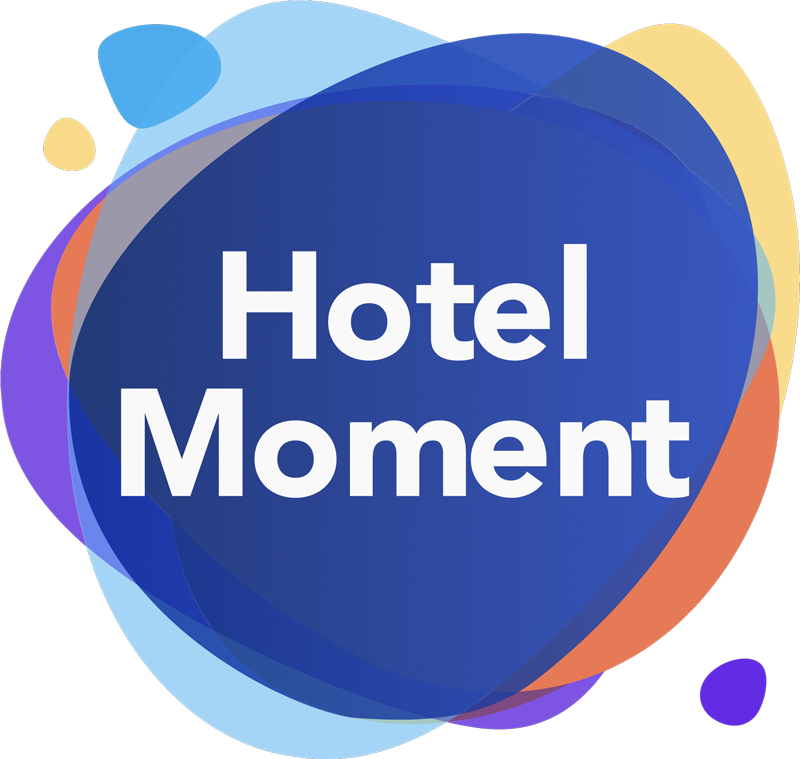

Be the first to know when a new episode drops
This site is protected by reCAPTCHA and the Google Privacy Policy and Terms of Service apply. *Required fields.




